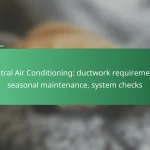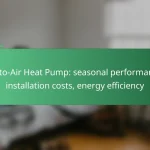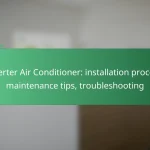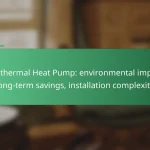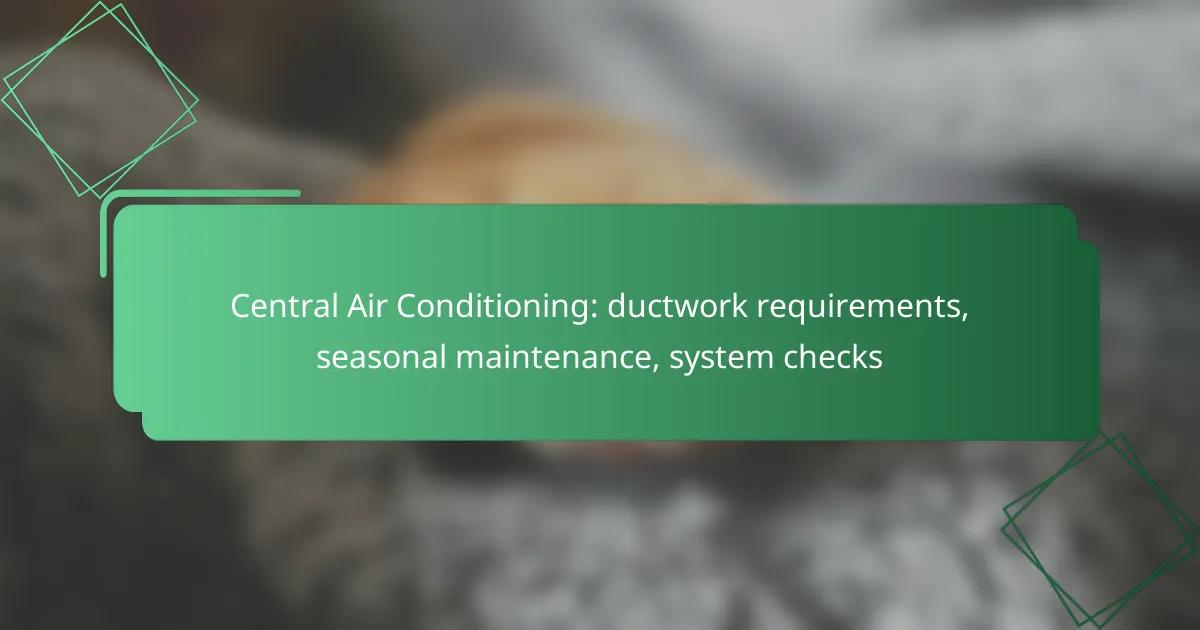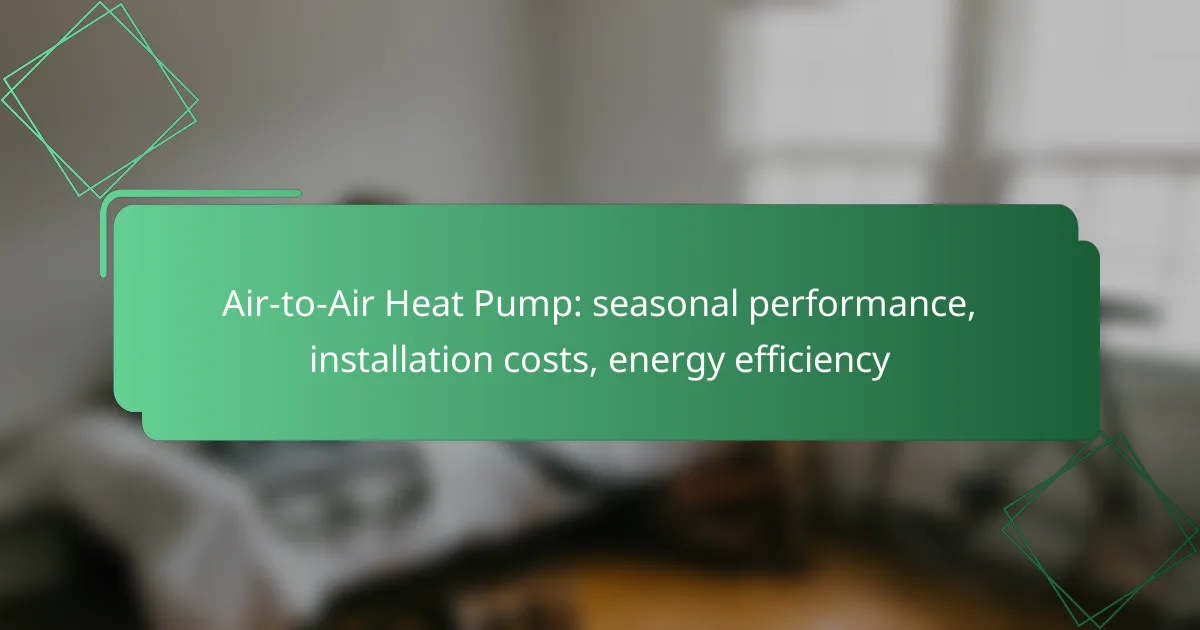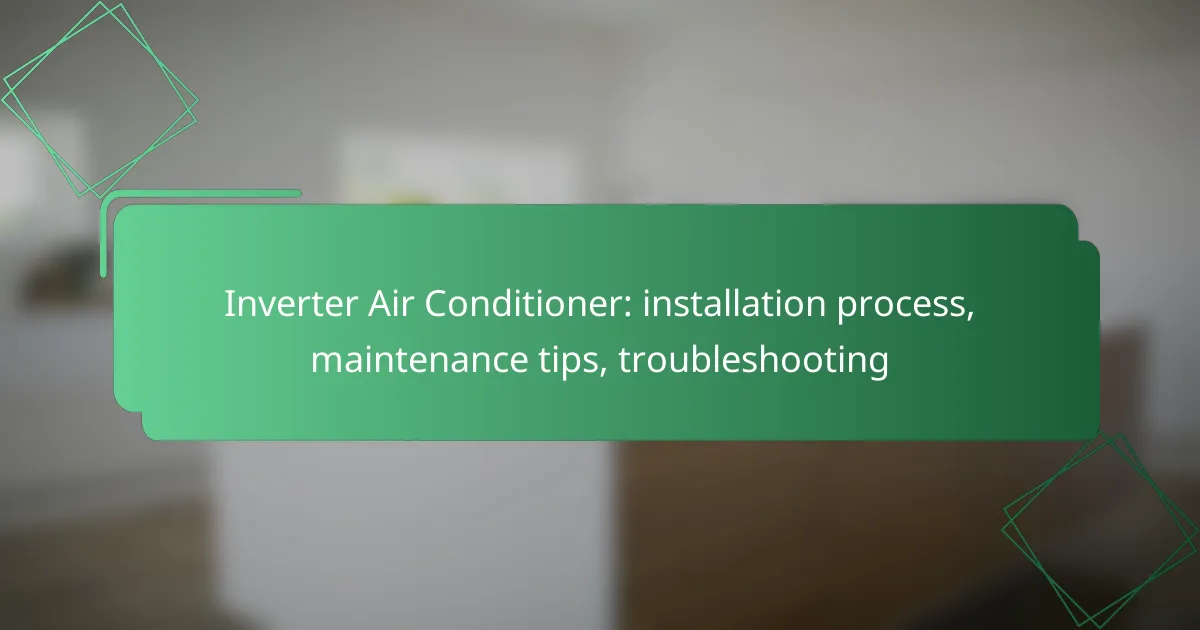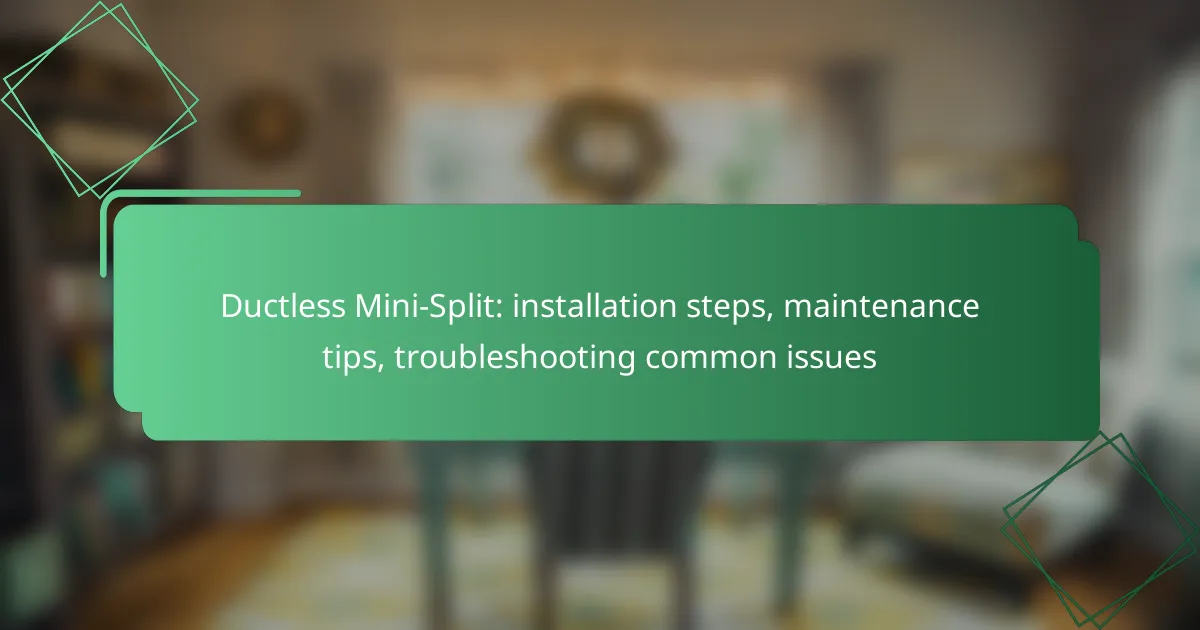Installing a hybrid air conditioner requires careful consideration of site assessment, electrical and plumbing needs, and compliance with local regulations. Regular maintenance is crucial for optimal performance, including tasks like filter replacement and annual servicing. Additionally, efficiency checks through metrics such as SEER and EER ratings help ensure the system operates at its best.
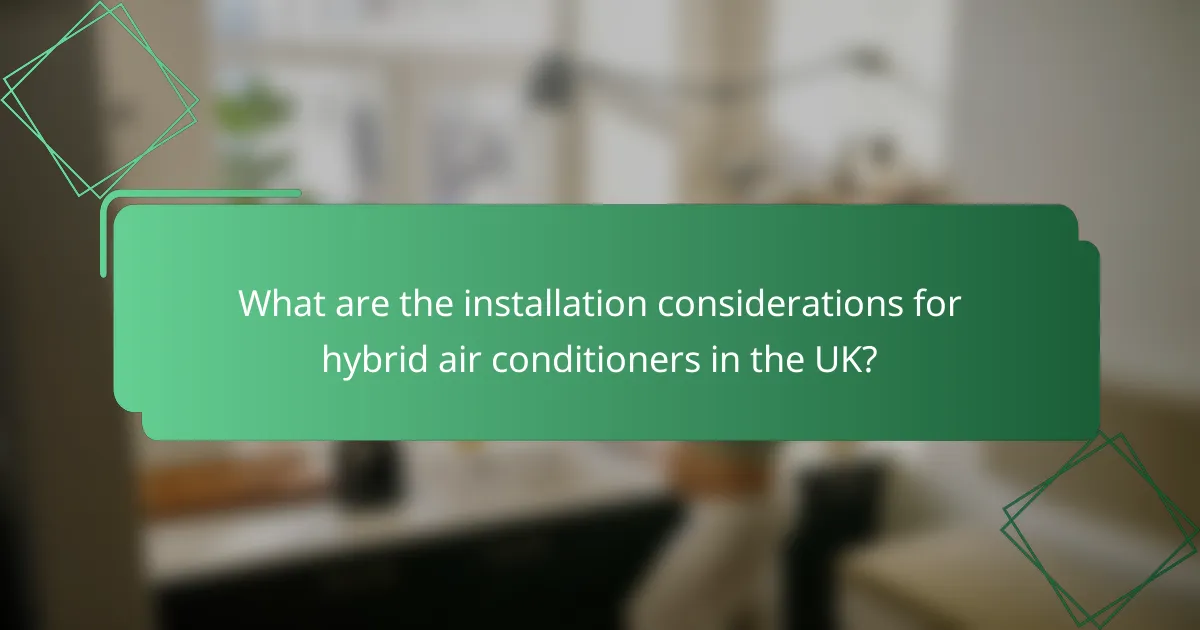
What are the installation considerations for hybrid air conditioners in the UK?
When installing hybrid air conditioners in the UK, it’s essential to consider site assessment, electrical and plumbing requirements, model selection, local regulations, and the need for professional installation. These factors ensure optimal performance and compliance with local standards.
Site assessment and space requirements
Conducting a thorough site assessment is crucial for hybrid air conditioner installation. Evaluate the available space to ensure adequate airflow and accessibility for maintenance. Ideally, the unit should be placed in a shaded area to enhance efficiency and reduce energy costs.
Consider the proximity to windows and doors, as well as the orientation of the building. A well-planned layout can significantly impact the system’s overall effectiveness and comfort levels within the home.
Electrical and plumbing requirements
Hybrid air conditioners require specific electrical and plumbing setups to function correctly. Ensure that your electrical system can handle the unit’s power demands, which may involve upgrading wiring or circuit breakers. It’s advisable to consult a qualified electrician for this assessment.
Plumbing considerations include proper drainage for condensate. Ensure that the installation site has suitable drainage options to prevent water buildup, which can lead to operational issues and potential damage.
Choosing the right model for your home
Selecting the appropriate hybrid air conditioner model depends on your home’s size, insulation, and specific cooling needs. Look for models with high energy efficiency ratings to minimize running costs. Consider features like variable speed compressors for better temperature control.
Consult with HVAC professionals to determine the best capacity for your space, as an undersized or oversized unit can lead to inefficiencies and increased energy consumption.
Local regulations and permits
In the UK, installing a hybrid air conditioner may require compliance with local building regulations and obtaining necessary permits. Familiarize yourself with the regulations in your area, as they can dictate installation practices and safety standards.
Check with your local council or a qualified installer to ensure that all legal requirements are met, which can help avoid fines and ensure the system operates safely and efficiently.
Professional installation services
Hiring professional installation services is highly recommended for hybrid air conditioners. Experienced technicians can ensure that the system is installed correctly, adhering to all regulations and maximizing efficiency. They can also provide valuable advice on maintenance and operation.
When selecting an installer, look for certified professionals with positive reviews and relevant experience. This investment in quality installation can lead to better performance and longevity of your air conditioning system.
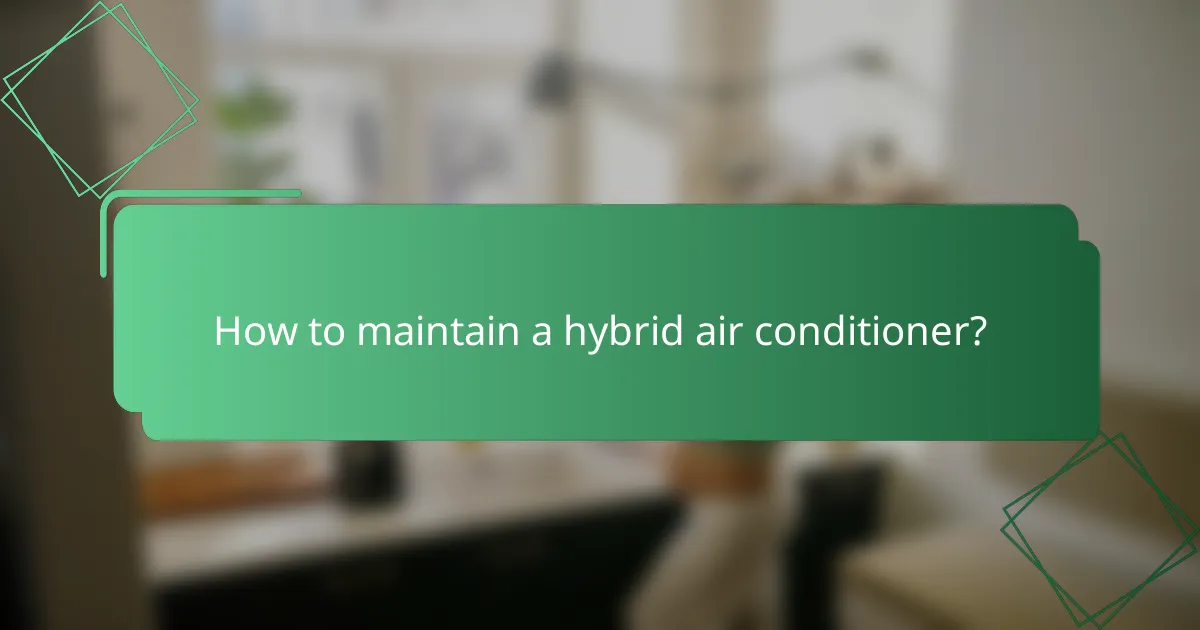
How to maintain a hybrid air conditioner?
Maintaining a hybrid air conditioner involves regular upkeep to ensure optimal performance and efficiency. Key maintenance tasks include filter replacement, annual servicing, outdoor unit cleaning, and refrigerant level checks.
Regular filter replacement
Replacing the air filters in your hybrid air conditioner is crucial for maintaining air quality and system efficiency. Filters should typically be checked every month and replaced every 1-3 months, depending on usage and filter type.
Dirty filters can restrict airflow, leading to increased energy consumption and potential system damage. Consider using high-efficiency filters to capture more particles and improve indoor air quality.
Annual professional servicing
Scheduling annual professional servicing is essential for the longevity and efficiency of your hybrid air conditioner. A qualified technician can perform a thorough inspection, clean critical components, and identify any potential issues before they escalate.
This service typically includes checking electrical connections, testing system controls, and ensuring that all parts are functioning correctly. Investing in regular maintenance can save you money on repairs and energy costs in the long run.
Cleaning the outdoor unit
Cleaning the outdoor unit is vital for maintaining airflow and preventing overheating. Debris such as leaves, dirt, and grass can accumulate around the unit, obstructing airflow and reducing efficiency.
To clean the unit, turn off the power, remove any debris, and gently rinse the fins with a garden hose. Avoid using a pressure washer, as it can damage the fins. Regular cleaning can help extend the life of your air conditioner.
Checking refrigerant levels
Regularly checking refrigerant levels is important for the efficient operation of your hybrid air conditioner. Low refrigerant levels can indicate leaks, which can lead to decreased cooling performance and increased energy costs.
If you suspect low refrigerant levels, contact a professional technician to assess and recharge the system as needed. Maintaining proper refrigerant levels ensures your air conditioner operates efficiently and effectively.
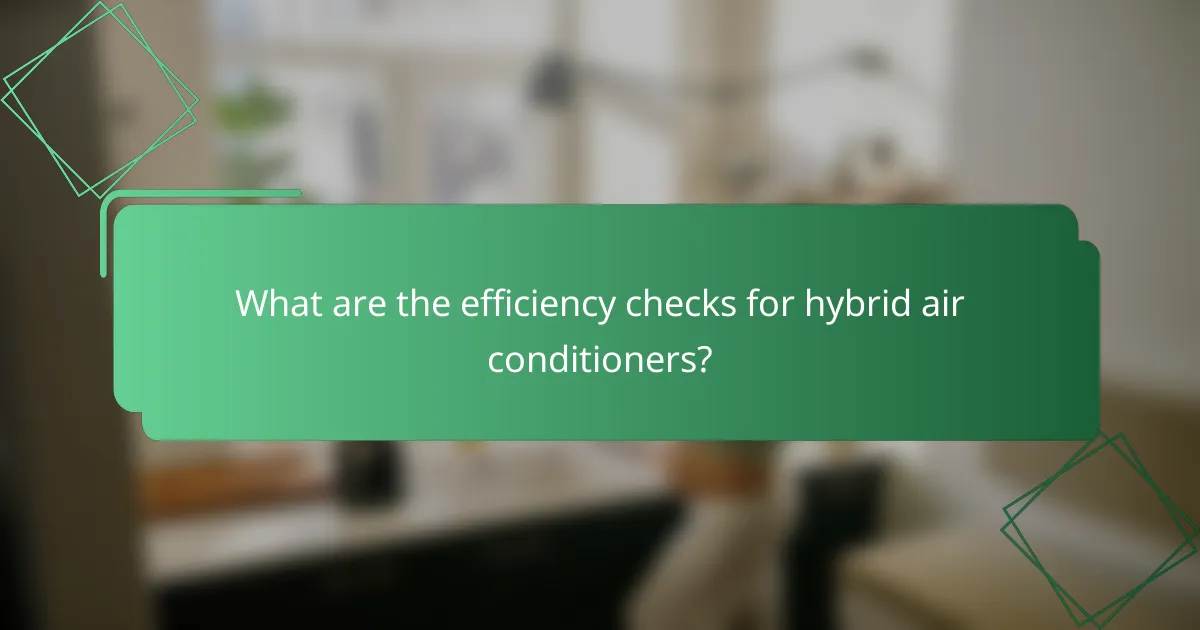
What are the efficiency checks for hybrid air conditioners?
Efficiency checks for hybrid air conditioners involve evaluating their performance through various metrics and assessments. Key areas include SEER and EER ratings, monitoring energy consumption, and conducting seasonal performance assessments to ensure optimal operation.
SEER and EER ratings explained
SEER (Seasonal Energy Efficiency Ratio) and EER (Energy Efficiency Ratio) are critical metrics for assessing the efficiency of hybrid air conditioners. SEER measures the cooling output during a typical cooling season divided by the total electric energy input, while EER evaluates efficiency at a specific operating point, typically at higher temperatures.
In general, a higher SEER rating indicates better energy efficiency, often translating to lower utility bills. For hybrid systems, look for SEER ratings above 15 and EER ratings exceeding 12 for optimal performance.
Monitoring energy consumption
Regularly monitoring energy consumption helps identify inefficiencies in hybrid air conditioners. Use smart meters or energy monitoring devices to track usage patterns and detect any spikes that may indicate issues.
Establish a baseline for energy consumption during peak and off-peak seasons. This data can help in making informed decisions about maintenance or upgrades, ensuring the system operates efficiently year-round.
Seasonal performance assessments
Conducting seasonal performance assessments is essential for maintaining the efficiency of hybrid air conditioners. These assessments should include checking refrigerant levels, cleaning filters, and inspecting ductwork for leaks.
Schedule these evaluations at the beginning of the cooling and heating seasons. This proactive approach can prevent costly repairs and ensure the system operates at peak efficiency, maximizing comfort and minimizing energy costs.
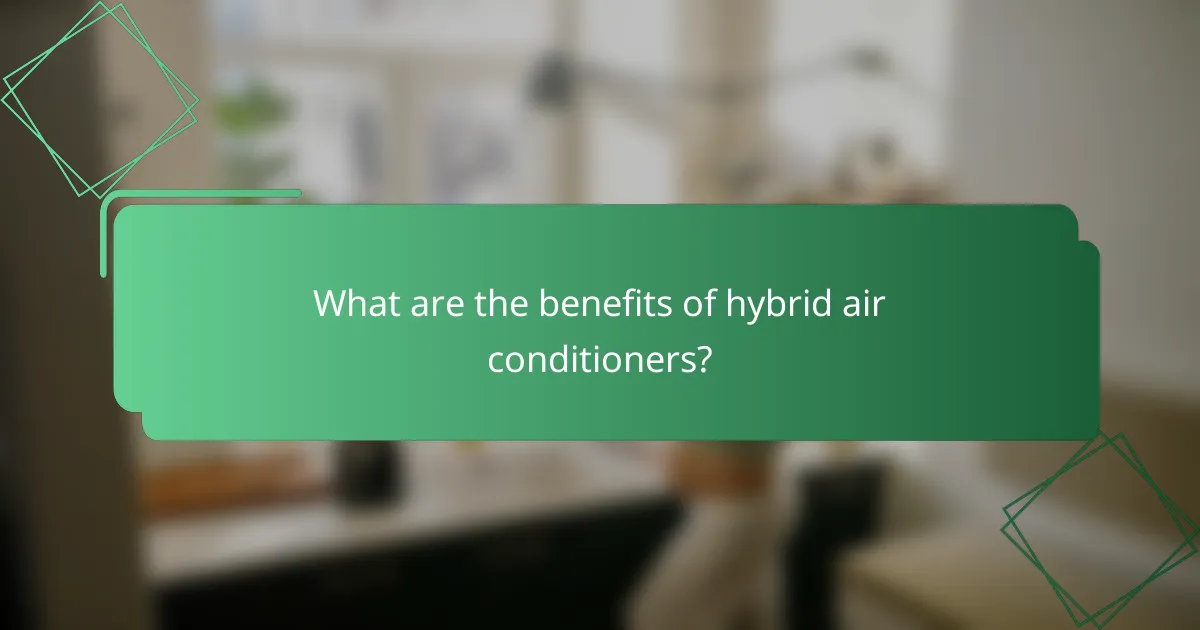
What are the benefits of hybrid air conditioners?
Hybrid air conditioners combine traditional and renewable energy sources to provide efficient cooling and heating. They offer significant advantages in energy savings, environmental impact, and adaptability to various climates.
Energy efficiency and cost savings
Hybrid air conditioners are designed to optimize energy use, often resulting in lower utility bills. By switching between electric and gas power, these systems can operate more efficiently, especially during peak demand periods.
Homeowners can expect energy savings of around 20-50% compared to conventional systems, depending on usage patterns and local energy costs. Regular maintenance, such as cleaning filters and checking refrigerant levels, can further enhance efficiency.
Environmental impact reduction
Using a hybrid air conditioner can significantly reduce greenhouse gas emissions. By relying on renewable energy sources, these systems help decrease the carbon footprint associated with heating and cooling.
Many regions offer incentives for using energy-efficient appliances, which can further encourage the adoption of hybrid systems. Homeowners can contribute to a more sustainable environment while potentially benefiting from tax credits or rebates.
Versatility for different climates
Hybrid air conditioners are versatile and can adapt to various climate conditions. They can efficiently manage both heating and cooling needs, making them suitable for areas with fluctuating temperatures.
In warmer climates, the system can prioritize electric cooling, while in colder regions, it can switch to gas heating. This adaptability ensures comfort year-round and can lead to improved performance in diverse weather conditions.
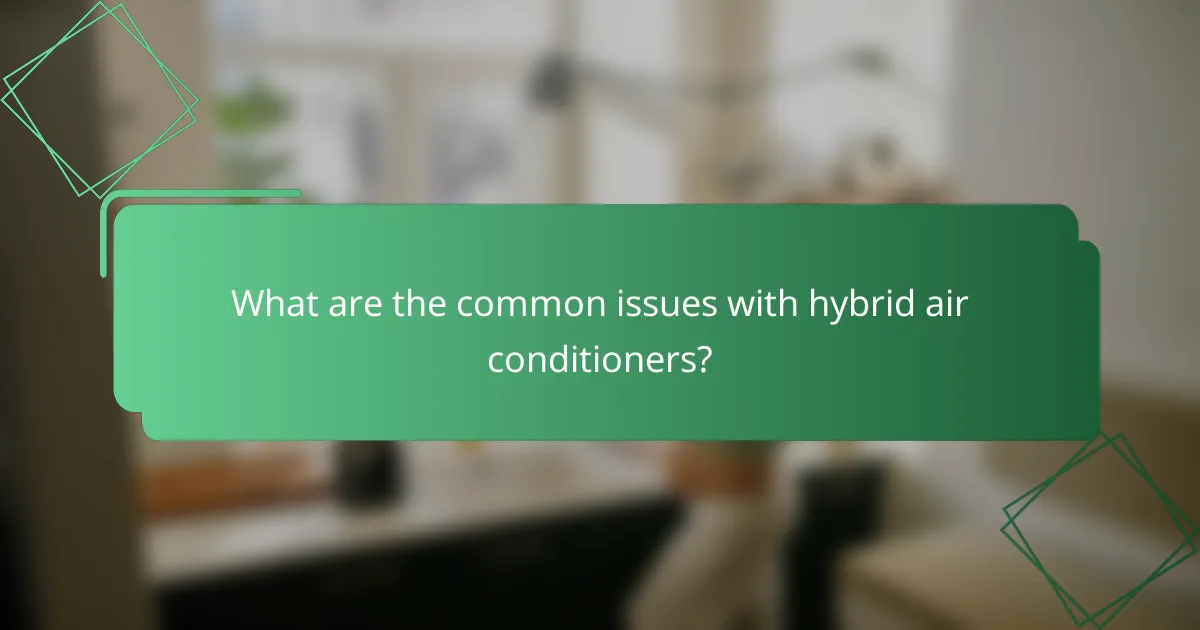
What are the common issues with hybrid air conditioners?
Common issues with hybrid air conditioners include inefficient operation, improper installation, and maintenance challenges. These problems can lead to increased energy costs and reduced comfort levels in your home.
Installation considerations
Proper installation is crucial for the efficient functioning of hybrid air conditioners. Ensure that the unit is sized correctly for your space, as an oversized or undersized unit can lead to inefficiencies. Additionally, consider the placement of the outdoor unit to avoid obstructions that could impede airflow.
Hiring a qualified technician for installation is recommended to comply with local building codes and regulations. They can also ensure that the refrigerant lines are properly connected and that the electrical components are safely installed.
Upkeep requirements
Regular maintenance is essential for keeping hybrid air conditioners running smoothly. This includes changing or cleaning filters every few months to maintain airflow and efficiency. Additionally, inspect the outdoor unit for debris and ensure that the coils are clean to prevent overheating.
Scheduling annual professional check-ups can help identify potential issues early, such as refrigerant leaks or electrical problems. Keeping a maintenance log can also help track service dates and any repairs made.
Efficiency checks
To ensure your hybrid air conditioner operates efficiently, regularly monitor its performance. Check the thermostat settings and ensure they are set to comfortable levels without excessive energy use. A good rule of thumb is to set the thermostat to around 24°C (75°F) during the cooling season.
Consider using energy monitoring tools to track usage patterns and identify any spikes in energy consumption. If you notice a significant increase in your energy bills without a change in usage, it may indicate a need for maintenance or repair.

